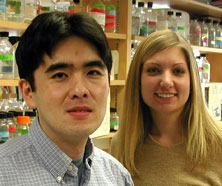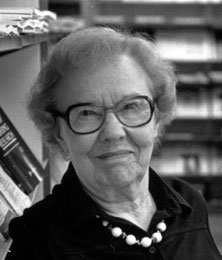|
|
For Release: March 21, 2005
Contact: DMS Communications (603) 650-1492
First E. Lucile Smith Biochemistry Awards Announced

Dr. Nobu Ohgami and Elizabeth Harris
Hanover, NH - Inaugural awards in a new program that pays tribute to an eminent DMS biochemist who was the first woman to become a full professor at Dartmouth were presented at a reception on March 11. The E. Lucile Smith Award for Scientific Excellence in Biochemistry went to graduate student Elizabeth Harris and postdoctoral fellow Dr. Nobu Ohgami.
"We named the award after Dr. E. Lucile Smith in honor of her dedication to both service at DMS and in the Biochemistry Department and her outstanding scholarly activities," said Dr. Duane Compton, professor of biochemistry who headed the award committee. Annual prizes will recognize both a graduate student and a postdoctoral fellow in the biochemistry program who demonstrate exceptional commitment and outstanding scholarship in biochemistry as primary author on publication(s) during the previous year, he said.

Dr. E. Lucile Smith
Smith was internationally acclaimed for her work on cytochrome oxidase, an enzyme system involved in energy metabolism. She joined the DMS biochemistry faculty in 1958 and became the first woman at Dartmouth to attain the rank of full professor when she was promoted in 1964. She became professor emerita in 1978, but remained an active teacher and researcher as well as a guiding presence in the department for many years. She died at the age of 90 in 2003.
Graduate student recipient Elizabeth Harris works in the lab of Harry Higgs, assistant professor of biochemistry, and published work in 2004 on factors that regulate the cytoskeletal protein actin in the Journal of Biochemistry and in Current Biology.
Postdoctoral awardee Dr. Nobu Ohgami works in the lab of T. Y. Chang, professor and chair of biochemistry, published a paper in the Proceedings of the National Academy of Sciences relating to how cellular proteins bind and store cholesterol.
-DMS-